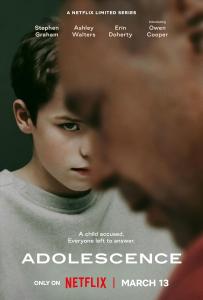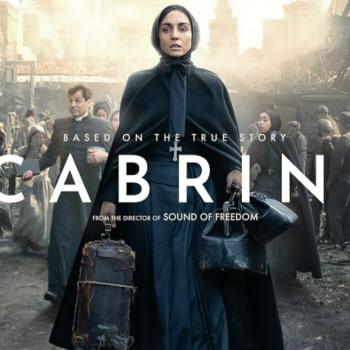Deserves To Be Seen And Awarded
Last weekend, I watched “Adolescence,” the new four-part Netflix series, and it haunts me. You take a good, nice, middle-class British family living in the nice suburbs, where the parents (dad Eddie, played by Stephen Graham, and mom Manda, played by Christine Tremarco) think all is well behind the bedroom door of their 13-year-old son, Jamie ( Owen Cooper).
This series, a soul-searing commentary on the family and society, deserves to be seen and awarded. The writing is brilliant. It’s excellent “television” because it is art. By not showing violence, the series shows it all the more and with heartbreaking effect. The writing (by Stephen Graham and Jack Thorne) is superb. The casting and acting deserve recognition.
Terrified And Shocked
When the cops show up to arrest Jamie on suspicion of the stabbing murder of Jamie’s classmate, Katie, it is more than a couple of police officers who make the arrest; it’s a S.W.A.T. team. It’s very early in the morning, and everyone is asleep. The parents and older sister, Lisa (Amélie Pease), are terrified and shocked.
The fictional series, based on the rise in knifing assaults in the U.K. and troubling social media groups, covers the next 13 months. We get the story through the perspective of one of the detectives, D.I. Luke Bascombe (Ashley Walters), the eyes of a child psychologist, Briony Ariston (Erin Doherty), and, of course, the parents, especially Eddie.
Visit “Adolescence” on Wikipedia to learn what happens in each episode. I will try not to give away the ending here.
Universe Of Innocence
What haunts me about this series is what we don’t see: the inner turmoil and anguish of the characters involved in this tragic, modern crime that starts with bullying in school, migrates to a social media group of outcasts using coded language and plays out in real life. There is something very David Lynch-ian about the series. The severed ear in the grass in “Blue Velvet” represents corruption in neatly trimmed suburbia; Jamie’s situation represents violence-inspiring ideas rushing roughshod through cyberspace in a universe of innocence – a nice bedroom in a nice house in a nice, hard-earned suburb in England.
We never see the crime, though Britain’s ever-present CCTV taped it. We don’t see anything out of place. Eddie sees the footage because he is Jamie’s “appropriate adult” but doesn’t discuss it. Trying to read Eddie’s face and body language is like watching a masterclass in acting as he tries to hide his reaction from everyone. (In 1984, the UK passed a law that appoints an adult to support a child, vulnerable persons, or someone with mental health issues while they are in police custody to ensure their rights are protected when being questioned.)
Nothing Is Out Of Place
Throughout the process, the police treat Jamie kindly; the environment is sterile as if he were there for a doctor’s visit. He has steadily proclaimed his innocence and continues to do so. It was hard for me even to imagine police being kind to a young person or anyone in custody. If you watch enough Dateline, 48 Hours, or 20/20, you see that most cops and prosecutors don’t have a reputation for kindness, fairness, and respect in the United States – except maybe in the fictional Law & Order’s. But after watching “Adolescence” for a while, you get it. In this British drama, nothing is out of place in police-dom. The cops are present, almost benevolent, nice, and professional – front and center. They don’t make any judgments about Jamie. No missteps here.
D.I. Bascombe (and his partner D.S. Misha Frank, played by Faye Marsay) visit the nice school where Bascombe’s son Adam attends. As the interviews proceed, Bascomb struggles emotionally with his relationship with his son as he investigates what and when the students in Jamie’s year knew and if anyone else was involved. Bascombe’s character pulls us into the soul of a father whose job pulls him away from seeing his son’s reality. He feels the pull and pulling, and so do we.
Not Supposed To Feel
Seven months later, young psychologist Briony Ariston arrives to interview Jamie at the juvenile center where he is being held. She is friendly and warm and the second or third psychologist who interviews Jamie for the the court. He is smart and quick, at first cooperative, and then tries to one-up her, thinking he can figure out what she is asking and why. He desperately wants to be liked; over and over, he asks if she likes him, but in the end, she does not give him that satisfaction, professional to the last. After Jamie leaves the room, she is exhausted and about to collapse in on herself, yet her heart seems broken and wounded for the child and herself. She is not supposed to feel, but she does. And so do we.
Although Jamie’s entire family is present throughout, and both parents are involved, or so they thought, in Jamie’s life, it is Stephen Graham’s Eddie who externalizes his inner reality more than anyone else. He responds angrily when kids tag his work van; he is repelled – and surprised – when he meets a young sales associate at the DIY store who supports Jamie’s online ideas and life. We find out that Eddie’s dad was a bully, and Eddie wanted his life to be different; he wanted to be a good father and husband, and he is. He is ashamed of his unresolved anger that is festering beneath the surface. However, he and his wife know nothing about their son’s inner life and hidden social media interaction until it is too late. They wonder how they were able to raise both Lisa and Jamie. Though they never asked Lisa about her inner life or checked her social media activity, they bond closely.
Caught Up In Ideologies
I didn’t want the series to end, but I realized it was over. It had to be over. There was no more to say or to do. It made me feel for all parents, and I prayed for them so they would know what to do and when to start doing it.
Adolescence is almost always difficult. (I have a family member who says she is still recovering from her daughter’s teen years—25 years later.) The French philosopher Jean-Jacques Rousseau is said to have written in the 18th century that “The child who was only self-aware now begins to look at others and to want their approval. A new world opens to him, and he is no longer the same being.” And this was in a world without the exponential intensification of the child’s “relationship” with social media – especially if that child, like Jamie, is caught up in ideologies like Incel, young men who are “involuntarily celibate” because girls, women, reject them, or seem to.
What Could Go Wrong?
“Adolescence” made me feel the inner lives of the main characters. I liked them. They are all good people. It is unclear if they have a faith life but they believe in life, that it can be good. Yet the depth of their love, disappointment, and quiet despair, tinged with hope, is inescapable and with me still – haunting me. The series is one nice family’s fictional story, but it is also a cry for help – for parents, children, and families in this hidden online world. Control may help when they are young, but without parental communication of values and motivational guidance, a child exploring the world in isolation and often anonymity, well, what could go wrong?
Sure, they thought they knew what was happening with Jamie.
But there is so much that lies beneath.
How do we reach them there?












